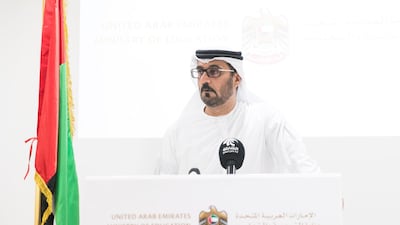Private schools across the country will be subject to greater scrutiny by the Government to ensure they are teaching pupils to the highest standards, the Minister of Education said.
British and American curriculum schools will be among those assessed to ensure their pupils are finishing with English language, maths and science skills that make them ready for university, Hussain Al Hammadi said.
The minister set out what he said was the goal of ensuring better education standards. "We want to ensure that the core subjects taught at all private schools, such as American, British and Australian, are aligned with our standards," he said in an interview with The National.
Mr Al Hammadi said there was a concern about the number of pupils who were leaving school and having to sit a foundation year at university that focuses on improving their English and other abilities.
He revealed that 65 per cent of pupils attending universities take a foundation year, at significant cost to the Government and families and extending a degree to at least five years.
“When a pupil finishes high school, we want to make sure that he or she has all the capabilities that would allow them to directly go to university – without the need for additional courses,” Mr Al Hammadi said.
On Sunday, major changes were announced to government schools – primarily attended by Emiratis and a small number of Arabic-speaking expatriates. At present, government schools outside Abu Dhabi are run by the federal Ministry of Education on one curriculum, while Abu Dhabi government schools are run atheir own curriculum set out by the Abu Dhabi Education Council.
This will be replaced with a single Emirati School Model will be rolled out across the emirates when pupils return to class next week.
On Monday, further changes were set out, including that government school pupils would study more subjects in English, particularly science.
On Tuesday, Mr Al Hammadi sharpened set out the focus on ensuring private schools were up to scratch.
________________
Read more
> UAE President announces plans to unify education in all government schools
> More emphasis on science and English in UAE government schools shake-up
________________
Over the next two years, a joint commission from Adec, the Ministry of Education and Dubai’s private education regulator, the KHDA, will “work with private schools” to ensure that core subjects such as mathematics, English and science are aligned with the new national standards, Mr Al Hammadi said.
“We don’t want to have kids going through foundation years or dropping out from higher education,” he said.
“All our efforts are to maintain and give all the support to locals and expatriates living in the UAE to have successful years ahead.
“We are seeking a 100 per cent success rate [for pupils reaching university without sitting the foundation year].” He said a trial of the new model in a number of Dubai schools last year was successful.
Some of the country’s most costly schools follow the British and American curriculums but others have struggled to meet standards.
This year, Adec publicly named the poorest-performing schools and banned them from registering pupils until they improved.
The most significant change that parents and pupils in some public schools will notice next week is that maths and science will be taught in English. There will be no change to schools in Abu Dhabi, where these subjects are already taught in English.
This was one of the main differences between schools in Abu Dhabi and the Northern Emirates.
But Mr Al Hammadi said the focus was much greater than simply what language subjects are taught in.
“You can teach mathematics or science in any language, it’s the depth of the subject and what competencies pupils have gained once they graduate,” he said.
“Even if you are private schools, we want your [pupils’] skills and competencies to be up to university standards once they graduate. We have many UAE nationals studying in private schools, so this [Emirati School Model] guarantees a top quality outcome.”
As an example of the challenge some Arabic-speaking pupils face when they reach university, one mother, Umm Fares, phoned a radio station in tears, saying that she could no longer afford to pay for her daughter’s IELTS exams, a test of English language proficiency.
“I have six kids and my daughter was told that she has to pass the IELTS to be admitted to university,” she told Radio 1. Her daughter spent a year in foundation but failed the IELTS exam twice and was refused admission. Each time, Umm Fares had to pay about Dh1,000.
Dr Natasha Ridge, the executive director of the Sheikh Saud bin Saqr Al Qasimi Foundation for Policy Research, an education-focused think tank, said closer inspections of private schools – of which there are more than 550 in the UAE – would be a logistical challenge.
Dr Ridge said the authorities would probably have to assess their exams, which are marked and regulated by companies in the UK, US and India.
“It will be quite a challenge and require a lot of manpower to visit and check all the private schools,” she said.
“Curriculum documentation has to be checked and, further to that, you have to verify that schools are delivering the curriculum in the best way by looking at exam results.”
She said British schools, whose pupils all sit GCSE and A-level exams, would be relatively straightforward but American schools follow several curriculums.
Dr Ridge also suggested that teachers in both sectors were also likely to come under scrutiny.
“The Ministry of Education’s curriculum is already in line with international norms but the gap is in what is implemented versus what is attained, due to things like teachers not having enough qualifications or adequate training.
“Often what is delivered is not in line with what is intended and so what pupils achieve is much less than what is hoped for,” she said.

